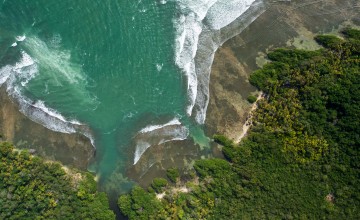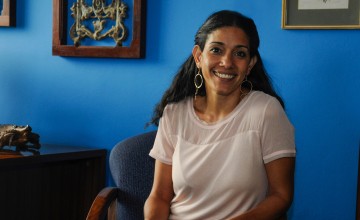
I thrive on collaboration, teamwork and building new and exciting interdisciplinary approaches needed to address pressing challenges in marine environments. My contributions vary in sector and scope, but my most important accomplishments relate to outcomes from working with communities and decision-makers to identify needs and science-based solutions.
Projects and Stories
Research Focus
We use social science and interdisciplinary research methods to study how natural resource use, access, and associated outcomes for people are socially and politically mediated by natural, social, economic, and political processes occurring across scales (e.g., local to global). Broadly, our work encompasses three themes: the future of ocean governance, human dimensions of coupled natural human systems, and the links between development, policy, and socio-environmental change.
Additional links
Contact
Research Overview
What is the role of human-wellbeing in the future of Ocean Governance?
The coupled challenges of human development and sustainability (e.g. climate crisis, global pandemic, poverty, food insecurity) shape our future, providing unique opportunities to redefine how we get there. Now, ocean concerns include conversations about biodiversity and sustainability and are increasingly tied to emissions reduction targets, data and science for decision-making, and negotiations about the use and conservation of the High Seas. Supporting the well-being of human communities and ocean sustainability through equitable approaches to ocean governance that consider the social impacts of and necessary enabling and disabling conditions for effective interventions is critical to the success of these efforts.
What is the study of the ‘human dimension’ in the context of the natural environment?
The human dimension—the many ways through which we understand the past, present, and future of human interactions with the natural environment—includes all things human: behavior, culture, societal structures, education, policy, and law, among others. Importantly, human dimensions can be scientific, analytical, interpretive, applied, and interdisciplinary.
Social science disciplines help us understand the human dimension, taking scientific approaches to the study of, for instance, human behavior (i.e., psychology), human societies and structures (i.e., sociology), and politics and power at local, national, and global scales (i.e., political science).
The humanities (e.g., history, literature, philosophy, arts, etc.) use interpretation to find meaning across environmental phenomena. Often, the study of the human dimension of the environment is needed to help inform solutions in the context of grand challenges such as climate change and biodiversity loss. In this case, we use applied disciplines as applied economics or policy analysis to inform decision-making. And finally, some fields, such as environmental anthropology or human geography, drawn from the methods of both the social and natural sciences to activate our knowledge of both.
What is adaptive capacity, in the context of climate change?
While definitions of adaptive capacity varies across the literature, in the context of our study of California shellfish farmers’ perceptions and strategies used to adapt to changing ocean conditions (Ward et al. 2022), we define adaptive capacity as: the ability of aquaculture operators to adjust to challenges caused by OA and other environmental stressors, to take advantage of opportunities to adapt to these challenges, and to effectively respond to their consequences. This useful definition can be applied more broadly to expanding studies that assess adaptive strategies and use these to inform climate change policies that are better aligned with stakeholder needs.
Education
M.A., University of Miami, Rosenstiel School of Marine and Atmospheric Science, 2004
Ph.D., University of California, Santa Cruz, 2011
Selected Publications
Shellock, R. J., Cvitanovic, C., Mackay., M., McKinnon, M. C., Blythe, J., Kelly, R., van Putten, I.E., Tuohy, P., Bailey, M., Begossi, A., Crona, B., Fakoya, K. A., Ferreira, B. P., Ferrer, A. J. G., Frangoudes, K., Gobin, J., Goh, H.C., Haapasaari, P., Hardesty, B. D., Häussermann, V., Hoareau, K., Hornidge, A. K., Isaacs, M., Kraan, M., Li, Y., Liu, M. L., Lopes, P. F. M., Mlakar, M., Morrison, T., Oxenford, H., Pecl, G. T.., Penca, J., Robinson, C., Selim, S., Skern-Mauritzen, M., Soejima, K., Soto, D., Spalding, A. K., Vadrot, A., Vaidianu, N., Webber, Wisz, M. C. (2022). A global perspective on turning barriers into enablers of female leadership within interdisciplinary marine research organisations. OneEarth.
Crosman, K., Allison, E. A., Ota, Y., Cisneros-Montemayor, A., Swartz, W., Bailey, M., Barclay, K. M., Blume, G., Colléter, M., Fabinyi, M., Faustman, E. M., Griffin, P. J., Hanich, Q., Harden-Davies, H., Kelly, R. P., Kenny, T., Klinger, T., Kittinger, J., Nakamura, K., Pauwelussen, A., Pictou, S., Rothschild, C., Seto, K. L., Singh, G., Spalding, A. K. (2022). Social Equity is Key to Sustainable Ocean Governance. Ocean Sustainability. 1(1): 1-9.
Sullivan-Stack, J., D'Iorio, M., Spalding, A. K., Chan, F., Pearsall, D., Maxwell, S., Aburto, O., Brooks, C., Duffy, E., Friedlander, A., Gaines, S., Gerber, L., Hines, E. M., Leslie, H., Lester, S., Lynham, J., McCauley, D., Micheli, F., Nickols, K., Palumbi, S., Pike, B., Pikitch, E., Sala, E., Sancho, G. A., Suman, D. O., Wilhelm, A., Wenzel, L., Sykora-Bodie, S., Fulton-Bennett, H., Cabral, R., Bradley, D., Mayorga, J., Dunn, D., Grorud-Colvert, K., Hinrichs, S., Fonseca, K., Shrestha, J., Cheng, S. (2022). A Scientific Synthesis to Inform Effective Protected Areas in the U.S. Ocean. Frontiers in Marine Science 9.
Grorud-Colvert, K., Sullivan-Stack, J., Roberts, C., Constant, V., Horta e Costa, B., Pike, P., Kingston, N., Laffoley, D., Sala, E., Claudet, J., Friedlander, A., Gill, D., Lester, S., Day, J., Gonçalves, E., Rand, M., Villagomez, A., Ahmadia, G., Ban, N.C., Gurney, G., Spalding, A. K., Bennett, N., Briggs, J., Morgan, L., Moffitt, R., Deguignet, M., Wenzel, L., Pikitch, E., Darling, E., Hameed, S., DiCarlo, G., Guidetti, P., Cury, P., Shah, N., Harris, J., Sack, K., Cao, L., Fernandez, M., Lubchenco, J. (2021). The MPA Guide: A Framework to Achieve Global Goals for Ocean Protection. Science 373(6560): eabf0861.
Spalding, A. K. and DeYcaza, R. 2020. Navigating Shifting Regimes of Ocean Governance: From UNCLOS to Sustainable Development Goal (SDG) 14. Environment and Society 11(1): 5-26.
Dundas, S. J., Levine A. S., Lewison R. L., Doerr A., White C., Galloway A. W. E., Garza C., Hazen E. L., Padilla-Gamiño J., Samhouri J. F., Spalding A. K., Stier A., White J. W. (2020). Integrating Oceans into Climate Policy: Any Green New Deal needs a splash of blue. Conservation Letters e12716.
Spalding, A. K. (2020). Towards a Political Ecology of Lifestyle Migration: Local Perspectives on socio‐ecological change in Bocas del Toro, Panama. Published online 30 January 2020. Area.

